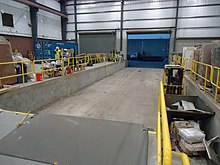
Back لوجستيات Arabic لوجستيه ARZ Loxística AST Logistika Azerbaijani Лагістыка Byelorussian Логистика Bulgarian পণ্য স্থানান্তর বিদ্যা Bengali/Bangla Logística Catalan Logistika Czech Logistik Danish

Logistics is the part of supply chain management that deals with the efficient forward and reverse flow of goods, services, and related information from the point of origin to the point of consumption according to the needs of customers.[2][3] Logistics management is a component that holds the supply chain together.[3] The resources managed in logistics may include tangible goods such as materials, equipment, and supplies, as well as food and other consumable items.
In military logistics, it is concerned with maintaining army supply lines with food, armaments, ammunition, and spare parts apart from the transportation of troops themselves. Meanwhile, civil logistics deals with acquiring, moving, and storing raw materials, semi-finished goods, and finished goods. For organisations that provide garbage collection, mail deliveries, public utilities, and after-sales services, logistical problems must be addressed.[2]
Logistics deals with the movements of materials or products from one facility to another; it does not include material flow within the production or assembly plants, such as production planning or single-machine scheduling.[2] Logistics occupies a significant amount of the operational cost of an organisation or country. Logistical costs of organizations in the United States incurred about 11% of United States national gross domestic product (GDP) as of 1997. In the European Union, logistics costs were 8.8% to 11.5% of GDP as of 1993.[2]
Dedicated simulation software can model, analyze, visualize, and optimize logistics' complexity. Minimizing resource use is a common motivation in all logistics fields. A professional working in logistics management is called a logistician.
- ^ Jon Hurdle (13 May 2021). "Report details surge in warehouse construction…". NJ Spotlight News. Retrieved 3 January 2023.
In South Jersey, the area has become the "epicenter" of warehouse construction in the greater Philadelphia region..'Activity in the Southern New Jersey industrial market continues to amaze,' the report said.
- ^ a b c d Ghiani, Gianpaolo; Laporte, Gilbert; Musmanno, Roberto (2004). Introduction to Logistics Systems Planning and Control. John Wiley & Sons. p. 1, 5, 10–15. ISBN 9780470849170. Retrieved 8 January 2023.
- ^ a b Kozlenkova, Irina V.; Hult, G. Tomas M.; Lund, Donald J.; Mena, Jeannette A.; Kekec, Pinar (December 2015). "The Role of Marketing Channels in Supply Chain Management". Journal of Retailing. 91 (4): 586–609. doi:10.1016/j.jretai.2015.03.003.
Logistics refers to "that part of supply chain management that plans, implements, and controls the efficient, effective forward and reverse flow and storage of goods, services, and related information between the point of origin and the point of consumption in order to meet customers' requirements"